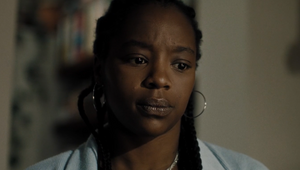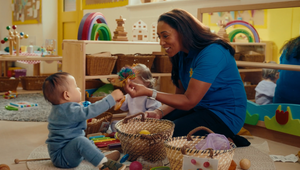
Elle Dimond and Sam Buchanan Announce Their New Production Company, Rabble

Elle Dimond and Sam Buchanan are stepping into a new chapter with the launch of their production company, Rabble. Having built their careers as agency creatives and directors, the pair are now channelling their experience into running their own operation — one that spotlights talent in the South West of England and brings a fresh perspective to filmmaking.
As part of LBB’s ‘The Directors’ series, Elle and Sam discuss their vision for Rabble, the evolving challenges of modern directing, and the importance of creative trust in an ever-shifting industry.
Name: Rabble (Elle Dimond and Sam Buchanan)
Location: UK
Repped by: Treacle7
LBB> What are some upcoming projects that you're excited about?
Sam> The big new project is our production company that we've started together, Rabble. We've both been in agencies for a long time, and have worked together as creatives and directors but now we're running the business side of this operation too.
We're really happy with how we're presenting ourselves through our brand new site, how our work looks and feels, because we've got such a unique offering in the video space. We’re looking to just get our voice out there, and see what kind of response we get, who we can connect with, and what kind of content we can create.
Elle> I think coming from being individual directors, we have the opportunity to use both our skills together now as well, either as a directing duo or taking on more individually. So it’s super exciting.
And also just seeing how we can tackle treatments together, it was something we were probably doing already. Sam would get a treatment, or I would get a pitch, and we cross reference the jobs we were getting together. Now we can officially do that together.
LBB> What excites you in the advertising industry right now, as a director? Any trends or changes that have opened up new opportunities?
Sam> The big change for any freelance director is that it feels like the days of just having briefs wash up and come to you are over.
A lot of directors that we know have felt a shift in how work is being achieved, and I think that means that you need to be more proactive in how you engage with clients.
With us and the relationships we have with our clients there's trust there. They know who we are, they know what we offer. And it just feels that that's the sort of relationship that feels really golden at the moment.
Elle> Strategically, you need to make the content work for multiple platforms. And whether that's the agency or the end client, they're going to be super conscious of how that creative idea transcends and works across different formats.
Clients want content to work a lot harder, which ultimately is more challenging for the director on the day. Modifying the content to suit the platform can’t just be an afterthought, you need to have that understanding from the get-go, because it's not enough anymore just to be amazing, creative and have fun ideas.
LBB> What elements of a script sets it apart and what sort of scripts get you excited?
Sam> For me, a lot of my independent directing work has been fun niche comedy ads. So often, when I get a treatment, people have an idea of what I can bring because they know my comedy style - which is great.
If I have a treatment where there's a fun little comedic concept that just needs a bit of punching up to be funnier or to be clearer, I'm happy.
Elle> I'm probably the opposite. It’s not that I don't like comedy, but I don't t do it as much.
Over the last couple of years, I've done a lot more charity-based work, that’s more heartfelt and emotive. I like having the room to put my own mark on something. I hate having a project that’s already predetermined and set out. As a director, when that happens you feel like you're performing a very fundamental role. Whereas, if you're given the opportunity to push it, or add your own stamp, or be experimental or bold, it's more exciting.
LBB> If the script is for a brand that you're not familiar with or you don’t have much affinity with or it’s for a market, how much research do you do to understand that strategic side and contextualise the campaign ?
Sam> The biggest mistake you can make is just making films about yourself, or making it just for you – that's something I really try to break away from. Understanding who you're making the film for is so important. We did a big conference opener film for a law firm last year and understanding my idea of bold and their idea of bold were two very different things.
Elle> Sometimes that can be a challenge at the treatment stage, especially if you're working through an agency, because you don't have that direct client relationship, so you can go a bit blind. You might do a treatment and push things or go one way, and they absolutely don't want that – they want what they've developed with the agency. You take a risk, and actually, sometimes it's not worth it.
LBB> What type of work are you most passionate about – is there a particular genre or subject matter or style you are most drawn to?
Sam> This job allows me to work across various different genres. Adding my own creative stamp to a project makes it fulfilling. It’s the secret sauce to the brief which takes it somewhere interesting. That sense of ownership is hugely fulfilling.
Elle> It comes with trust. If you have a client that allows you the freedom to bring your own creativity, then you’ll make something you’re passionate about, and it will come through in the end product. But if you're not given that freedom, challenges will inevitably arise. It comes down to the client and the relationship there, how much they're willing to let go, and let you do what you want to do.
LBB> What misconception about you or your work do you most often encounter and why is it wrong?
Sam> That comedy is easy. There's no such thing as a cheap laugh, and that's why, when an ad gets a laugh out of me, I'm a big fan of whoever made it. It's so hard to navigate the advertising, video production and film process to keep something pure and funny in there, no matter how silly it is. That's really difficult to do.
It's why comedies don't win at the Oscars. People think it's easy, it's easy when it works, but if you try to be funny, it's really hard.
Elle> I would say the value in the team that the director is bringing to the table is probably underrated. Directors assemble particular teams for certain projects and the value of that skill is often underestimated.
That's a really misunderstood aspect of directing. It's becoming more and more normal for people to cut corners because of costs. If you ask a director to cut corners, the quality of work will change, because it will impact the sort of team you end up getting. People at the top of their game are there for a reason.
As a director, that's really tough, because you're fighting with whoever takes care of the budget to get those crucial ingredients into place.
LBB> How do you strike the balance between being open and collaborative with the agency or client, while also protecting the idea?
Sam> It's a hard balance, especially when protecting your idea, but you've just got to accept that the film is for them. And it's just so easy, especially in my early years as a creative director, to safeguard to such an extreme, it becomes a detriment to everyone else.
You can't do that. You have to be collaborative. But then if you're too collaborative, the idea turns into soup. So it's tricky.
Ellie> It’s about client management.
You've got to trust who you’re working with and have the client backing you on all the key moments. You need that dialogue otherwise things get missed or unnecessary things get pushed back.
It's give and take on both sides, and you just need to see things from their point of view. You can get more savvy with experience, when you understand where they're coming from. But don’t be too precious, because at the end of the day it's their film, and you're selling their product.
LBB> What are your thoughts on opening up the production world to a more diverse pool of talent? Are you open to mentoring and apprenticeships on set?
Ellie> I do a lot of mentoring with BFI Academy and sometimes guest lecture at universities. I'm also part of a big South West WhatsApp group, for opening up the local industry to involve more young people and people from different backgrounds.
That's what is really important to me, and really important going forward, in terms of trying to get more people on set who are new to the industry. It's definitely a big issue, and something that should be taken seriously. And where possible, I'm keen to nurture that going forward, and just open up those opportunities.
LBB> Which pieces of your work do you feel show what you do best – and why?
Sam> My favourite piece of comedy work is a short film called ‘Every Sport a Bowling Ball’, which features a montage of different sporting scenes that go wrong. It's the one project I get the most traction from my work.
Elle> For me, my work with Women’s Aid and their survivors felt really poignant as it gave me an opportunity to highlight the work that they do. I was able to meet the survivors and speak to them, to share authentic stories which we incorporated into the narrative.
I also look favourably at a recent piece I did with Media Trust. The project had a very small, modest budget, but we've made a really nice ad that highlighted homelessness in Bristol, and how close vulnerable people can be to losing their home.
It's currently in the final selection for the Smiley Charity Film Awards. I’m really proud of it – we staged different scenes in the streets but then zoomed out and actually the action took place in a car park or back alley. It was about subverting expectations.















